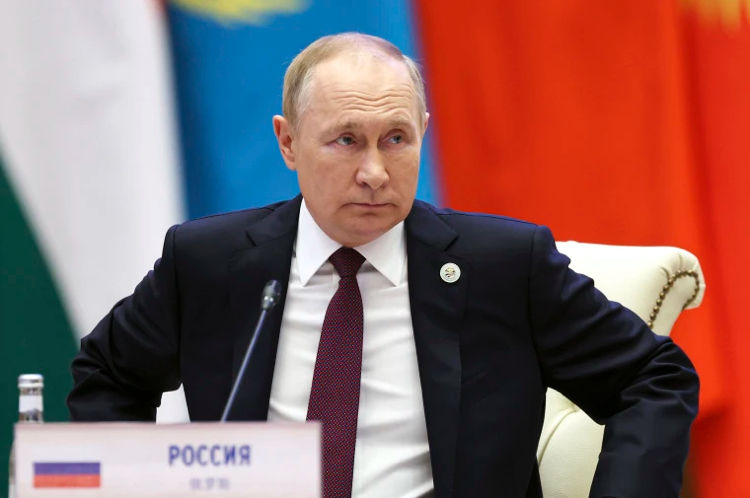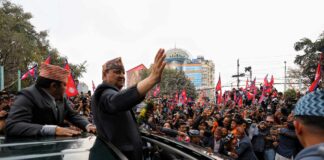The International Criminal Court’s international arrest warrant against Russian President Vladimir Putin and his Commissioner for Children’s Rights, Maria Lvova-Belova, for deporting Ukrainian children to Russia could have unintended adverse geopolitical consequences for the US and Ukraine.
It could strengthen Russo-Chinese ties and accentuate the North-South divide to the detriment of broader US and Western interests.
It is noteworthy that this is the first time that the ICC has issued a warrant against a leader of one of the five permanent members of the UN Security Council. Hence its special importance for the world at large. For the US, the stakes in the gamble are too high to lose, though Washington is not directly involved in the issuance of the Warrant. It was issued after more than 40 members of the ICC sought it. But undeniably, that could not have happened without Washington’s nod.
The immediate implication of the warrant is limited because the chances of Putin’s being arrested and forced to face trial at the ICC are slim. Russia does not recognize the ICC’s jurisdiction and therefore out of bounds in a way. But his travels to countries which became members of the ICC by signing and ratifying the Rome Statute would be in jeopardy because these countries might arrest him.
“Putin might go to China, Syria, Iran, his few allies, but he just won’t travel to the rest of the world and won’t travel to ICC member states which he believes would arrest him,” Adil Ahmad Haque, an expert in international law and armed conflict at Rutgers University told Associated Press.
Russo-Chinese Relations
The ICC’s move is a part of the West’s no-holds-barred conflict with Russia which has seen the employment of a variety of strategies. But the timing of the warrant is signed. It came a few days ahead of the proposed visit of Chinese President Xi Jinping to Moscow apparently with a proposal to put an end to the devastating Russia-Ukraine war or the US-Russia proxy war.
Probably, the expectation in the West is that a psychologically beleaguered Putin, facing the prospect of arrest in a foreign country, would be constrained to agree to Xi’s peace proposal.
But the warrant could well have the opposite effect. It could strengthen Russo-Chinese relations. This is because China is resolutely opposed to sanctions and other punitive actions, just as Russia is. An arrest warrant against Xi cannot be ruled using the Uighur issue. Therefore, Xi is likely to support Putin on the warrant issue and extend the scope of its support.
And if there is a consolidation of the Putin-Xi nexus, the loser will be Ukraine because Xi may abandon his peace offer. Ukraine will then have to continue to be the bloody arena of an unending US-Russia armed conflict, with Russia getting enhanced support from China and the US stepping up its arms aid to Ukraine.
Global South
The warrant could also split the Global South into pro-West and anti-West groups. There is already a complaint in a section of the Global South (in Africa principally) that the ICC is going after and punishing only leaders of the Global South while turning a blind eye to the human rights violations by the militaries of the US and UK in various countries in the Global South.
According to a piece in Foreign Affairs entitled The Role of theInternational Criminal Court(https://www.cfr.org/backgrounder/role-international-criminal-court), there have been 31 cases before the ICC, out of which eight have resulted in acquittals or no charges, while five have resulted in reparations or imprisonment. The ICC has indicted more than forty individuals, all of them, significantly, from African countries.
Of course, cases have been referred by governments of the Global South also. Uganda, the Central African Republic, the Democratic Republic of Congo, and Mali had filed cases relating to the civil wars and other conflicts in these countries. In 2021, the ICC investigated alleged crimes against humanity in Venezuela based on a referral from six ICC member States, mostly from South America. The UN Security Council made its first referral in 2005 for alleged crimes in the Darfur region of Sudan. This was followed in 2011 by a referral to Libya.
In addition, the prosecutor’s office opened investigations proprio motu(on its own volition) in Kenya in 2010, the Ivory Coast in 2011, Georgia in 2016, Burundi in 2017, Bangladesh and Myanmar in 2019, Afghanistan in 2020, the Palestinian territories and the Philippines in 2021.
Alleged criminals from the Global South included Muammar al-Qaddafi of Libya, his son and brother-in-law. But Gaddafi was killed before he could be apprehended. Qaddafi’s son, Saif al-Islam, became a fugitive. President Omar al-Bashir of Sudan was the first sitting President of a country to be indicted by the ICC. He was charged with genocide in Sudan’s Darfur region. Bashir avoided arrest by travelling abroad because African and Islamic countries supported him. When he was arrested by his own military, an ICC delegation visited Sudan in February 2021 to extradite him. But the bid failed.
Kenyan leader Uhuru Kenyatta was investigated for violence that killed more than one thousand people in the aftermath of Kenya’s 2007 Presidential election. The ICC investigation continued even as Kenyatta won the Presidency in 2013 with fellow ICC suspect William Ruto as his running mate. But the ICC dropped the charges against the Kenyatta in 2014 and those against Ruto in 2016 for lack of cooperation from the Kenyan authorities.
The point to be noted in all this is that the ICC’s exertions have been restricted to the Global South (Africa especially). A blind eye had been turned to the doings of the US and the West, despite the horrors perpetrated by their militaries in Iraq, Libya and Afghanistan.
US Disregard
The US does not want to be subjected to the ICC. Washington has not ratified the Rome Statue which set up the ICC and is therefore not a member of the ICC. President Clinton had signed the Statute, but George W. Bush withdrew the signature in 2002. In 2002, Congress passed the American Service-Members’ Protection Act, which required the government to cut off financial assistance to ICC members who acted against US interests. The law authorized the President to use all means necessary to free Americans detained by the ICC. The Bush administration had also struck bilateral agreements with many countries obliging them not to hand over US personnel to the ICC.
The US was incensed over Chief Prosecutor Fatou Bensouda’s bid to investigate the US armed forces and CIA personnel for alleged war crimes in Afghanistan, as well as over her preliminary investigation into alleged Israeli crimes in the occupied West Bank and Gaza Strip. I
In 2018, the then National Security Advisor John Bolton declared that the government would not cooperate with the ICC and would block any efforts to pursue US or Israeli citizens. In 2019, Secretary State Mike Pompeo threatened to revoke the visas of ICC staff. In fact, Fatou Bensouda’s US visa was cancelled.
However, the US supports ICC actions when its personnel are not involved and the accused are from the Global South.
Prof. Brian Cox of the Cornell Law School says in his piece in Just Security ( https://www.justsecurity.org/74595/balancing-the-us-approach-to-the-icc/) that the US should go back to President Obama’s middle-of-the-road policy on ICC’s investigations to give its stance a measure of acceptability.
The Obama Presidency had stated that: “Although the United States is not at present a party to the Rome Statute of the International Criminal Court (ICC), and will always protect U.S. personnel, we are engaging with State Parties to the Rome Statute on issues of concern and are supporting the ICC’s prosecution of those cases that advance U.S. interests and values, consistent with the requirements of U.S. law.”
As for the UK, in 2021 it introduced a bill, sponsored by the Ministry of Defense, to limit vexatious claims against members of the British armed forces for crimes committed during overseas deployments.
China and India, which are outside the ICC, maintain that the ICC interventions will infringe their sovereignty. This has enabled both to violate human rights with impunity. Russia canceled its signature from the Rome Statute in 2016 after the ICC dubbed its 2014 incorporation of Crimea as an “occupation’.
And as pointed out earlier, African nations have accused the ICC of disproportionately targeting the African continent. Of the court’s more than two dozen cases, all have dealt with alleged crimes in African States. In 2016, the African Union backed a proposal led by Kenya for a mass withdrawal from the ICC, though there was no follow-up on this resolution.



 Logging you in...
Logging you in... Loading IntenseDebate Comments...
Loading IntenseDebate Comments...

